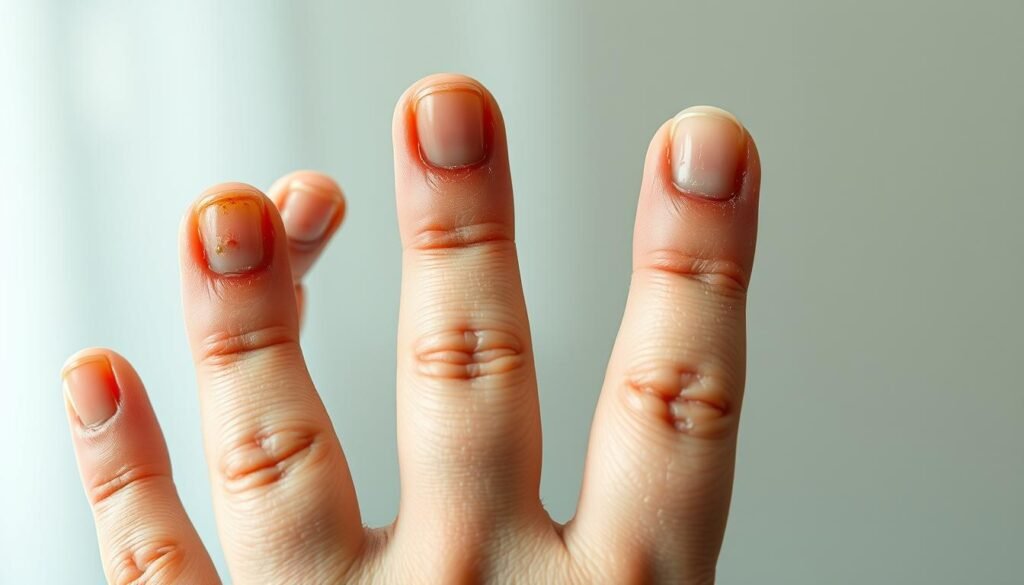Ever seen small depressions or lines on your fingernails and wondered what they mean? Nail dents, or nail abnormalities, are more than just a cosmetic issue. They might be hinting at something about your health.
Nail health is often ignored, but it can reveal a lot about your body’s state. From shallow pits to deep grooves, these nail problems can look different on each nail. Knowing why these dents happen is key to keeping your nails and health in check.
Did you know people over 40 are twice as likely to have nail pitting than those under 20? Or that about half of all psoriasis patients experience nail symptoms? These facts show how common nail dents are and their possible health connections.
Whether you’re dealing with nail pitting, Beau’s lines, or spoon nails, each dent can signal different health issues. Some might be linked to skin conditions like psoriasis or eczema. Others could point to autoimmune disorders or nutritional deficiencies. In rare cases, they might even hint at more serious diseases.
Key Takeaways
- Nail dents can be signs of underlying health issues
- Various types of nail abnormalities exist, each with different causes
- Age and certain medical conditions increase the likelihood of nail dents
- Nail health can reflect overall body wellness
- Recognizing nail changes early can lead to timely medical intervention
Understanding Nail Dents and Their Significance
Nail dents are oddities on the nail plate that look like lines, ridges, or holes. They often point to health problems. It’s important to know their types and causes.
What are nail dents?
Nail dents are small dips or odd shapes on your nails. They can be different sizes, shapes, and depths. They show various health issues. Nail pitting, for example, is small, shallow holes about 1-2 mm wide.
Types of nail dents
There are many types of nail dents:
- Pitting: Small, round depressions on the nail surface
- Beau’s lines: Horizontal depressions across the nail plate
- Spoon nails: Nails with a concave or cup-like shape
Importance of nail health
Your nail health can tell a lot about your overall health. Changes like ridges or pitting can mean different health problems. For instance, nail pitting might show psoriasis, eczema, or alopecia areata.
| Condition | Nail Symptom | Other Symptoms |
|---|---|---|
| Psoriasis | Nail pitting, ridges | Scaly skin patches |
| Eczema | Nail pitting, ridges | Itchy, inflamed skin |
| Alopecia Areata | Nail pitting | Hair loss in patches |
Knowing why nail dents happen can help spot health issues early. If you see lasting nail problems, see a doctor for help.
Common Causes of Nail Denting

Nail dents can come from many health problems. Knowing these causes helps you catch issues early. Let’s look at the main reasons for nail denting.
Dermatological Conditions
Skin issues often harm nail health. Psoriasis is a big problem, affecting up to 50% of people. It leads to pitting in both fingernails and toenails.
Eczema can also cause uneven, rough nail pits. This is more common if you have a family history of eczema.
Autoimmune Disorders
Autoimmune diseases can harm your nails. Alopecia areata, known for hair loss, causes fine nail pits. Lichen planus can also lead to nail problems, including denting.
Nutritional Deficiencies
Your diet affects your nails. Iron deficiency can make nails spoon-shaped. Protein deficiency can make nails brittle and prone to denting.
Zinc shortage can cause white spots on nails. These issues show how important diet is for nail health.
Systemic Diseases
Some diseases affect the whole body and nails. Sarcoidosis rarely affects nails but can cause pitting. Reactive arthritis, caused by infections, may also lead to nail denting.
These diseases show how nail changes can signal broader health issues.
| Condition | Nail Effect | Prevalence |
|---|---|---|
| Psoriasis | Pitting, crumbling | Up to 50% of cases |
| Iron Deficiency | Spoon nails | Common in anemia |
| Alopecia Areata | Fine pitting | Frequent in patients |
Why Do I Have Dents in My Nails: Medical Conditions Explained
Nail dents can signal health issues. Knowing why they happen is key to keeping your nails healthy.
Psoriatic arthritis often causes nail dents. It’s more common in people over 40. This condition is linked to psoriasis, an autoimmune disease affecting the skin and nails.
- Alopecia areata: Can lead to nail roughness and redness
- Dyshidrotic eczema: May result in nail pitting and discoloration
- Reactive arthritis: Can cause pitting, onycholysis, and nail dystrophy
- Sarcoidosis: May lead to thickening, discoloration, and brittleness of nails
Nutritional gaps, like in iron, protein, and zinc, can harm your nails. A 2018 study found biotin might help nail health. But, we need more research.
| Condition | Nail Symptoms |
|---|---|
| Psoriatic arthritis | Nail pitting, dents |
| Alopecia areata | Roughness, redness |
| Dyshidrotic eczema | Pitting, thickening, discoloration |
| Reactive arthritis | Pitting, onycholysis, dystrophy |
| Sarcoidosis | Thickening, discoloration, brittleness |
If you see lasting nail dents or other oddities, see a doctor. They can find the cause and suggest treatments to fix your nail health and overall health.
Diagnosis and Treatment Options for Nail Dents

Nail deformities can signal health issues. Getting a proper diagnosis is crucial for effective treatment. Your doctor will look at your nails and might order tests to find the cause of nail problems.
Medical Examination and Diagnostic Procedures
Doctors check your symptoms and health history. They might do skin biopsies. Nail clippings or scrapings could be tested for fungal infections. Rarely, a nail biopsy is needed to confirm conditions like psoriasis.
Topical and Systemic Treatments
Treatment depends on the cause of nail dents. For psoriasis-related issues, topical corticosteroids or vitamin D analogs are used. Severe cases might need systemic treatments like biologics or immunosuppressants.
- Topical antifungals for fungal infections
- Corticosteroid injections for inflammatory conditions
- Oral medications for systemic diseases
Lifestyle Changes and Home Remedies
Improving nail health is often simple. Eat a balanced diet with biotin, iron, and protein. Keep your nails moisturized and avoid harsh chemicals. Wear protective gloves when doing household chores to prevent nail damage.
“Early treatment intervention for nail problems is beneficial, and consulting a dermatologist can help in identifying the root cause and providing the appropriate treatment plan tailored to individual needs.”
Remember, nail dents can signal many conditions. If you notice lasting changes in your nails, see a healthcare professional. They can diagnose and suggest the best treatment options for you.
Conclusion
Knowing why nails get dented is key to keeping them healthy. Nail problems can show early signs of health issues. For example, dull nails might mean you’re lacking vitamin B. Indentations like Beau’s lines could point to serious diseases like diabetes or pneumonia.
Nail issues can happen to anyone, at any age. A study found nail problems in people aged 15 to 45. While some issues are minor, others can signal serious health problems. Yellow nails, for instance, might mean chronic bronchitis or even cancer.
If your nails keep changing, see a doctor. They can figure out what’s wrong and suggest how to fix it. Keeping your nails clean, eating well, and avoiding damage are important. These steps help keep your nails healthy and prevent future problems.
FAQ
What are nail dents?
Why is nail health important?
What are some common causes of nail denting?
What medical conditions can cause nail dents?
How are nail dents diagnosed and treated?
What can I do to maintain healthy nails?
Source Links
- What Is Nail Denting and What Causes It? – https://www.verywellhealth.com/nail-pitting-5199255
- 7 fingernail problems not to ignore – https://www.mayoclinic.org/healthy-lifestyle/adult-health/in-depth/7-fingernail-problems-not-to-ignore/art-20546860
- Everything to Know About Nail Pitting, According to Experts – https://www.popsugar.com/beauty/nail-pitting-49127966
- What Are Those Tiny Dents in Your Nails? 5 Possible Causes – https://www.health.com/nail-pitting-8606625
- Nail Pitting – https://www.webmd.com/skin-problems-and-treatments/nail-pitting-causes
- Nail Pitting: Causes, Treatment, and More – https://www.healthline.com/health/skin-disorders/nail-pitting
- Nail abnormalities Information | Mount Sinai – https://www.mountsinai.org/health-library/symptoms/nail-abnormalities
- Ridges in Fingernails: Symptoms, Causes, and Treatments – https://www.healthline.com/health/ridges-in-fingernails
- Nail problems – https://www.nhs.uk/conditions/nail-problems/
- Nail pitting: Signs, causes, and treatment – https://www.medicalnewstoday.com/articles/319321
- How a Dermatologist Can Help Treat Fingernail and Toenail Conditions. – https://www.medstarhealth.org/blog/fingernail-toenail-dermatology
- Nail Pitting: Causes, Treatment, and Prevention – GoodRx – https://www.goodrx.com/health-topic/dermatology/nail-pitting
- Here’s What Your Nails Are Telling You About Your Health – https://www.northwestpharmacy.com/healthperch/what-nails-telling-about-health
- Nail disorders associated with cast immobilization of the forearm and wrist: report of two cases and review of the literature – https://www.ncbi.nlm.nih.gov/pmc/articles/PMC8790182/
- Nailing Your Diagnosis: The Hand Exam | VisualDx – https://www.visualdx.com/blog/nailing-your-diagnosis-the-hand-exam/








Interesting read, but arent nail dents just a result of biting or picking at them? Does it really signify health issues?
Interesting read, but arent nail dents just genetic or wear and tear? Seems like a bit of an over-analysis to me.
Interesting read, but arent nail dents just a result of our careless nail habits? Not everything needs a medical explanation, right?
Well, why are we stressing about nail dents? Arent there bigger health issues to worry about? Just my two cents.
Am I the only one who thinks nail dents might just be genetics and not always a health concern? Sorry, just my 2 cents.
Interesting article, but isnt it possible that some nail dents are just genetic? Not everythings a disease, right?
Interesting read, but is it really dents or just our nails evolving? Bit of a stretch, but worth a thought, eh?
Interesting read, but dont you think more emphasis should be placed on how diet affects nail health? Just a thought!
Interesting read, but can a poor diet also contribute to nail dents? I think that aspect was missed out here.
Why obsess over nail dents? Arent there bigger health issues to worry about? Lets focus on heart disease or mental health instead, folks!
Interesting article, but isnt it a bit alarmist? Maybe my nails just have character and arent signaling doom?